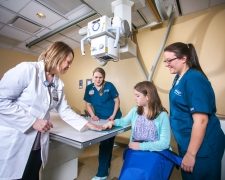The radiologic technologist is an essential member of the healthcare team dedicated to preserving patient health by helping to diagnose injury and disease through the use of medical imaging technologies.
As a radiologic technologist you will learn to operate x-ray equipment to create images of tissues, bones, organs, and blood vessels within the human body. The images will be interpreted by a radiologist, a physician who has specialized in interpreting and diagnosing radiographic images.
 Students will graduate with a Bachelor of Science in Radiologic Sciences after three consecutive years. Program graduates are eligible to apply for the national certification examination administered by the American Registry of Radiologic Technologists (ARRT). Individuals who pass the examination are known as registered technologists, RT(R).
Students will graduate with a Bachelor of Science in Radiologic Sciences after three consecutive years. Program graduates are eligible to apply for the national certification examination administered by the American Registry of Radiologic Technologists (ARRT). Individuals who pass the examination are known as registered technologists, RT(R).
Bellin College is dedicated to educating healthcare professionals through innovation, leadership, and service that promotes lifelong learning and excellence. In association with the mission of Bellin College, it is the intention of the Bachelor of Science in Radiologic Sciences program to educate medical imaging students who will function as proficient healthcare professionals and team members possessing a constant concern for quality patient care and technical competency. It is the College’s intention to maintain the highest program standards, thus ensuring accreditation by the Joint Review Committee in Radiologic Technology (JRCERT) guaranteeing graduates their eligibility for examination by the American Registry of Radiologic Technologists (ARRT). Program Goal 1: Graduates will demonstrate problem solving and critical thinking skills. Student Learning Outcomes: Program Goal 2: Graduates will have an understanding and appreciation for optimum radiation protection. Student Learning Outcome: Program Goal 3: Graduates will demonstrate professional behavior and effective communication skills. Student Learning Outcomes: Program Goal 4: Graduates will demonstrate entry-level competency as a medical imaging professional. Student Learning Outcomes: Program Goal 5: Graduates will portray leadership skills. Student Learning Outcomes: The performance of the Radiology Program at Bellin College is reflected through program effectiveness data defined by our accrediting body, the Joint Review Committee on Education in Radiologic Technology (JRCERT). Program effectiveness data includes: Visit Bellin College’s statistic’s page for more information: https://www.bellincollege.edu/about/statistics/ Information concerning the Bachelor of Science in Radiologic Sciences is maintained on the website as a requirement of its accrediting body JRCERT. Program Effectiveness Data can be found here. For more information regarding program effectiveness data visit the JRCERT website at http://www.jrcert.org. The Bellin College Medical Imaging Guide – Handbook and Catalog summarizes campus information pertaining to College resources, policies and procedures as well as student services and academic planning. A list of sample academic plans for the Bachelor of Science in Radiologic Sciences program can be found within the College’s Handbook and Catalog: https://catalog.bellincollege.edu/degrees The Joint Review Committee of Education in Radiologic Technology (JRCERT ) and the Higher Learning Commission (HLC). The program’s current award is 8 years. General program accreditation information and the current accreditation award letter can be found here. The radiologic sciences program is accredited by the Visit Bellin College’s Accreditation page for more information: https://www.bellincollege.edu/about/accreditation/Bellin College Mission
BSRS Program Philosophy
The Bachelor of Science in Radiologic Sciences program is fully accredited by:
Joint Review Committee on Education in Radiologic Technology.
20 North Wacker Drive, Suite 2850
Chicago, IL 60606-3182
312-704-5300
Email: mail@jrcert.org
The radiologic sciences program is a three-year, fully-accredited program, which will provide you with excellent academic and clinical experience in general radiography and two of the following specialties:
- CT Scanning (Computed Tomography)
CT technology uses x-rays and computers to produce very detailed 3-D images of patients and their medical condition. - MRI (Magnetic Resonance Imaging)
Used as a diagnostic tool by physicians, MRI uses magnetic fields and radio waves to diagnose diseases. - Women’s Imaging (Mammography and DXA Scanning)
Mammography uses low energy x-rays specifically for imaging breast tissue and can be used to screen for breast cancer. Mammograms play a key role in early breast cancer detection and help decrease breast cancer deaths.
View the BSRS traditional academic plan
Questions?
Please contact Bellin College Admissions at Admissions@bellincollege.edu,
(920) 433-6650, or use our online contact form.


